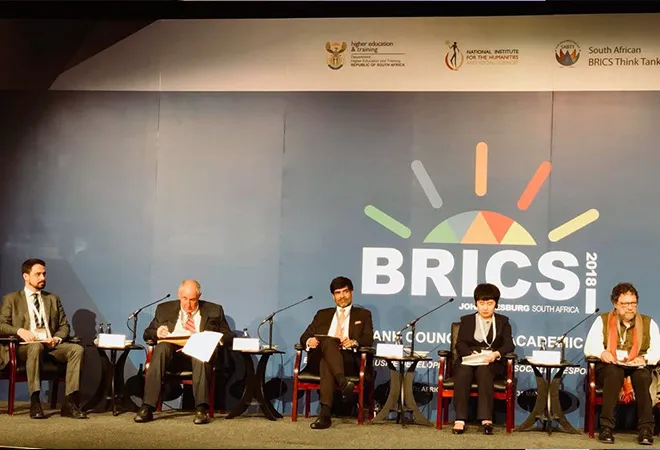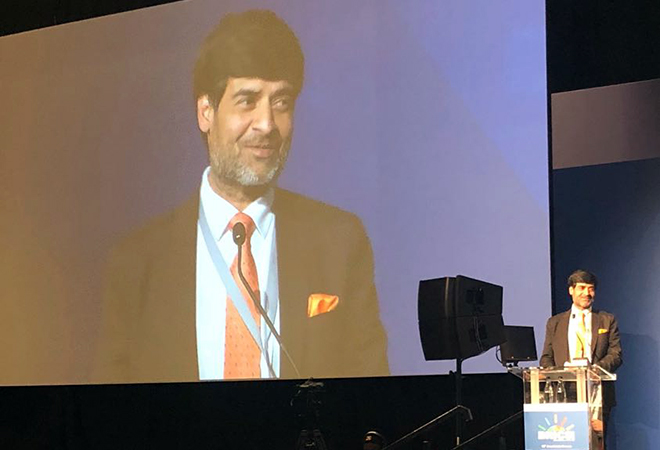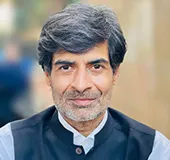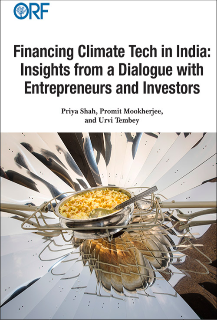
Opening address by ORF President at the BRICS academic forum, 2018.
It is my honour to be here and share this dais with you all, my esteemed colleagues — Dr. Ivan Oliveira from Brazil, Professor Georgy Toloraya from Russia, Ms. Dong Weihua from China and lastly of course Professor Ari Sitas who is the host and leading the South Africa team. Thank you, Professor, and a thank you to your excellent team. Please accept our congratulations and gratitude for your exceptional hospitality and for the curation of an excellent agenda for this forum.
We’ve already had a great start to the academic forum — thank you Minister Pandor for your insightful opening address touching on key issues that will shape the world and our common futures over the next three decades.
Personally, I am delighted to be back in South Africa. For many of us in India, travelling to South Africa is like a journey home. Our modern history was scripted by a noble soul who found his calling on this soil. It was in South Africa where the most significant modern Indian project was born and visualised by the father of our nation, Mahatma Gandhi.
We are at an important juncture in world history, in African history and certainly in the brief BRICS journey. We are now entering the second decade of BRICS and the next decade could see the grouping play a decisive and compelling role — a constructive role in a world characterised by disruptions and despondency that looks ever more parochial and partisan and seeks new energy and leadership if it is to continue to work together, grow together and prosper together. South Africa is a perfect venue for us, academics from the BRICS countries to commit ourselves to offer ideas for our political, business and civil society leaders to consider.
We are at an important juncture in world history, in African history and certainly in the brief BRICS journey. We are now entering the second decade of BRICS and the next decade could see the grouping play a decisive and compelling role — a constructive role in a world characterised by disruptions and despondency that looks ever more parochial and partisan and seeks new energy and leadership if it is to continue to work together, grow together and prosper together.
South Africa is turning a new chapter. Its institutions have valiantly defended democracy and these institutions and associated laws have allowed the country to tide over some of its most difficult moments. I’m a big believer in President Cyril Ramaphosa and I’m a part of “Ramaphoria”. This is a special moment for this very special nation and we are all with you.
I believe the blueprint for Africa may well be scripted by this new administration and I am also convinced that this new administration will infuse greater energy into South Africa’s international engagement not only in this forum but also in forums such as IBSA. It is evident that South Africa is important to the world and the world is important for South Africa. The next ten years may well see South Africa take a leadership role in ideas, innovation and sustainable development — not only for its own communities and people, but also by creating a template for the entire continent.
The South African leadership of BRICS therefore comes at an appropriate time. The world is struggling with democracy and South Africa has shown us how democracy can be preserved, how peaceful transition of power can be achieved, how bitter political contests can use democratic means to discover resolution. As such, in a world where pluralism is being threatened, South Africa is a shining beacon for this continent and much of the world.
As South Africa moves to version 2.0 and renews its journey, economic and political, the second decade of BRICS will deeply benefit from this. In the 90’s South Africa promised the world a new charter for itself and a vision for a New Africa. It has more than delivered — yet, as with all our nations, there remains more to be done.
As South Africa moves to version 2.0 and renews its journey, economic and political, the second decade of BRICS will deeply benefit from this.
Even as we discuss issues on health, gender, social protection, security, education and research, economics and finance, and energy and resources, each of these themes are and will be implicated by three overarching global realities that are shaping communities, politics and societies.
The first reality is that of identity - and imbedded in this identity debate are issues around nationalism, race, ethnicity. Technology has spawned digital communities that are shaping and challenging traditions and indeed our interactions with the “other” and with ourselves. Globalisation itself has disrupted notions of who we are. We are today all global citizens with unfettered exposure to our surroundings — near and far. Yet, we are increasingly seeking old anchors in uncertain times.

The BRICS project in many ways can help us un-clutter the identity challenge. While this group adopts an increasingly outward looking approach, the collective remains deeply cognisant of its own individual cultural and historical moorings. Globalisation and the celebration of unique cultures and diversity work together within BRICS. It is not necessary for global citizenship and local cultures to be in contest — rather they can work well together and serve the larger common purpose.
Yet, as we seek globalisation, we must ensure it is a version that leaves no person behind. We must seek globalisation that serves diversity and unique perspectives that make this world richer. We must seek technologies that serve humankind and are not designed only to further wealth and prosperity for a few. We must seek global institutions that serve people and not just those who fund them and create them.
As we seek globalisation, we must ensure it is a version that leaves no person behind. We must seek globalisation that serves diversity and unique perspectives that make this world richer. We must seek technologies that serve humankind and are not designed only to further wealth and prosperity for a few.
21st Century identity challenges are shaped by the residues of the past and are further compounded by today’s complexities — issues pertaining to technology, financial access and intellectual property.
For instance, with the advent of the Fourth Industrial Revolution, we experience a reconfiguration of traditional social and economic classes. The farm, factory and office are no longer the nodal point of economic activity and human interaction. As the importance of traditional workspaces erode, we have seen a regression to social, political, and religious beliefs of yore. The future of the work space, and work, then, will implicate our imaginations of our selves.
The BRICS community and the BRICS academic forum with their inherent diversity should provide a new template that is better able to address the challenge of identity in this digital age.
The second is the challenge of inequality. While the world has rightly focused on the undeniably important challenge of poverty eradication — it has not done enough on devising policies to respond to growing inequality. This single factor is implicating political and social stability all over the world. Inclusivity is not only about lifting individuals out of poverty but also about providing the same opportunities to all. The contours of inequality today are complex — there is inequality around access to resources, infrastructure, health and education. There is inequality around political agency. There are deeply embedded biases that prevent women leadership of political, social and economic spheres. There is inequality that still lingers from racial divides and colonial legacies.
The BRICS community and the BRICS academic forum with their inherent diversity should provide a new template that is better able to address the challenge of identity in this digital age.
The BRICS academics gathered here must take leadership in developing ideas and solutions that serve the purpose of equality and equity. We have an opportunity to be propositional and assume thought leadership on this most important risk and opportunity of our times.
Which brings me to the last challenge, that of ideology. The BRICS project of the next decade must take into account the ideological challenges arising from identity and inequality. How do we move from the development of women to women led development? How do we move from affordable housing to housing that affords basic dignity for all? How do we move from education for all to economic agency and upward mobility to all? How do we create financial models of investments that do not prey on people and countries? How do we invest in technologies that serve aspirations of all rather than scavenge data from people?
One of the pitched debates today is on the management of data. If data is to drive economic growth in the future, then data inequality must also be addressed. While the rich may be able to safeguard their data, the poor cannot afford the same luxury. Further, most of our data is housed outside of our borders, across the Atlantic. The question then is, how do we ensure the fair use of data and confer its ownership and benefits to the owners themselves. Perhaps the BRICS can provide a model for the rest of the world — it is replete with alternate solutions. Take for example the Aadhaar platform of India, the Chinese BAT framework, the Russian comparative advantage in mathematics and cryptography, the South African experimentation with financial inclusion and technology and, of course, Brazil, which pioneered the Bolsa Familia program of social inclusivity. These all offer templates that are non-Atlantic and more importantly templates catering to a whole new class of people. In our own experiments we have a treasure trove of successes and failures and we must share and then together shape a new ethic of digital growth devoid from the 20th century dogmas around socialism or capitalism, market or command economy. We must work with ideas and solutions that serve us and we must devise a new template for a digital world that makes ideas richer and ideologies weaker.
The BRICS project of the next decade must take into account the ideological challenges arising from identity and inequality.
The last decade of contemporary history has seen a vigorous renewal of ideology — from religious to economic to ethnic beliefs and cultural ecosystems. We have seen how each of them have had a significant impact on political systems and political outcomes. The digital revolution and social movements based on hashtags are creating new mobilisations that are challenging the normative order of the past, the implication of which are still unknown.
The BRICS today is a manifestation of a post ideology world — a world that can coalesce on principles, not necessarily based on political theologies. The Russian democratic system, the Chinese socialism based on new characteristics, the Indian model of political and economic choice, the South African experience and the Brazilian politics are all shaped by different histories and experiences. As an academic community it is important for us to catalogue and map these diversities of systems and to tease out and define the principles that have allowed us to work together.
The plurilateral BRICS club is proof that ideas can trump ideology. BRICS is an ideas project and the academic community must be in the driver’s seat of the ideation process. We can’t let our today restrict us from visualising a fairer and better tomorrow. Progress will not happen by chance — rather it will require the world’s collective efforts. Let us commit to this today at the summit of BRICS academics and with this spirit engage in informed debates and exchanges this week among this wonderful BRICS family.
The views expressed above belong to the author(s). ORF research and analyses now available on Telegram! Click here to access our curated content — blogs, longforms and interviews.





 PREV
PREV


